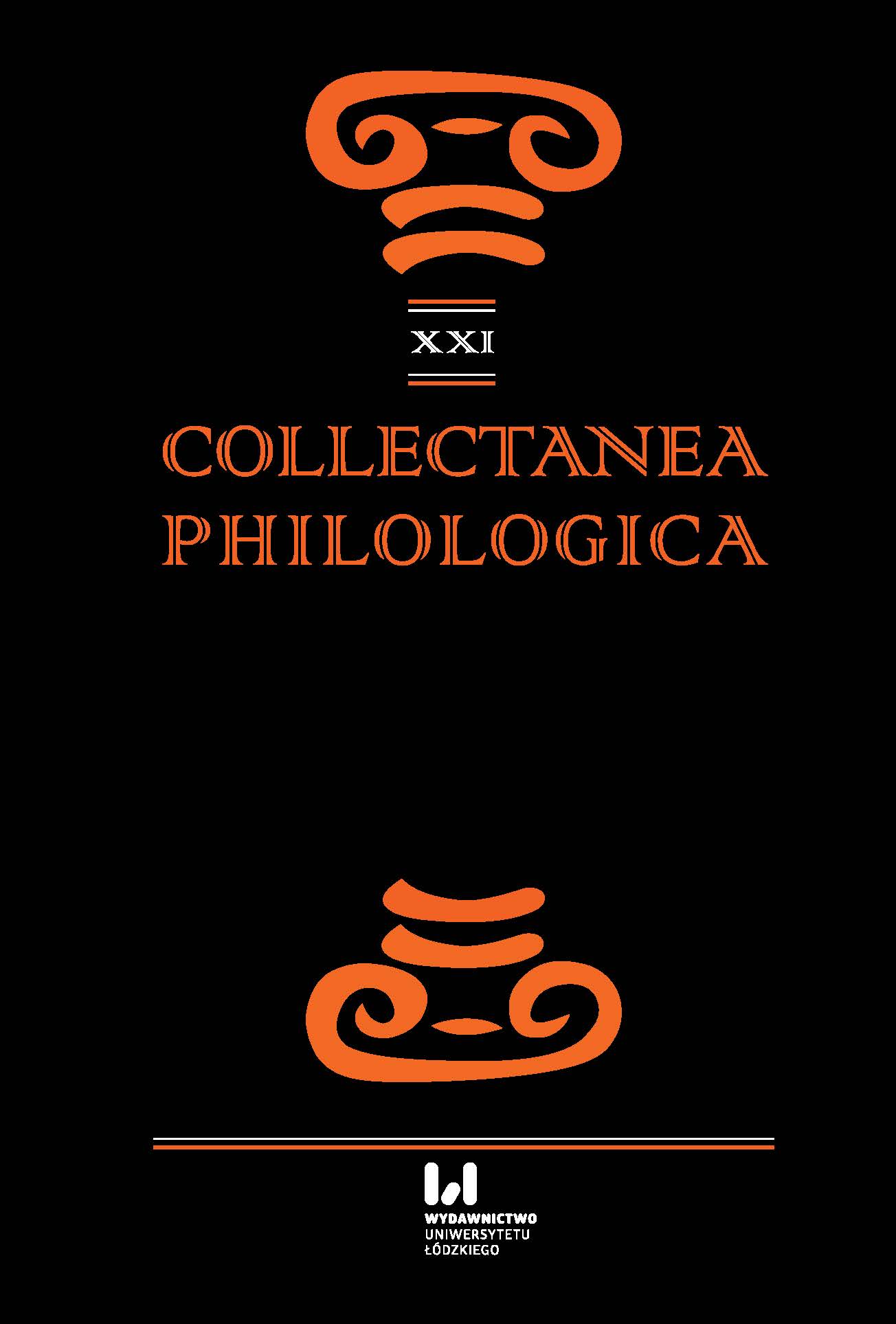Problem antycznej ekfrazy teatralnej. Część I: Postać
DOI:
https://doi.org/10.18778/1733-0319.21.03Słowa kluczowe:
ekphrasis, dramatis persona, ancient Greek tragedy, EuripidesAbstrakt
Ekphrasis is one of the forms that the Greek tragic dramatists used in their plays. From a dramaturgical point of view it was a very important element of play strictly connected with the conventions of the ancient theater. The examples taken from the Euripidean tragedy will be used to demonstrate the ways the ancient Greek tragedians applied ekphrasis in their works. Their review will start with descriptions, which can be conventionally called the ekphrasis of the theatrical “mask”. The term mask is understood here not sensu stricto as a part of actor’s costume, but as having a reference to what it hides. This type of ekphrasis may be found in visually inaccessible to the public of the Greek theater face of dramatis personae that is hidden behind the mask. It concealed facial expressions, so important to understand the action of the drama itself, as well as the role played by the actor. It is impossible to overestimate the importance of this dramaturgical element as a non-verbal means of communication which harmonizes with the text of play and its action and is crucial to perceive the intended meaning of the actors’ words.
Bibliografia
Chodkowski, R.R. (2007). „Na granicy obrazu scenicznego i słowa, czyli audioskrypcja supletywna w teatrze Sofoklesa”, [w:] From Antiquity to Modern Times. Classical Poetry and Its Modern Reception. Essays in Honour of Stanisław Stabryła. Jerzy Styka (ed.). Kraków: Księgarnia Akademicka.
Google Scholar
Claus, D. (1972). „Phaedra and the Socratic Paradox”. YCS 22. 223–238.
Google Scholar
Craik, E.M. (1987). „Euripides’ First Hippolytus”. Mnemosyne 40, 137–139.
Google Scholar
Czerwińska, J. (1999). Człowiek Eurypidesa wobec zagrożenia życia, namiętnej miłości i ekstazy religijnej. Łódź: Wydawnictwo Uniwersytetu Łódzkiego.
Google Scholar
Czerwińska, J. (2005). “Dramaturgiczny wymiar aktu ‘hiketei’ w ‘Hiketides’ Eurypidesa (L’aspect dramatique du rite de ‘hiketeia’ dans ‘Le Suppliantes’ d’Euripide), [w:] Euterpe, Terpsichore, Erato. Liryka grecka i jej recepcja, Classica Wratislaviensia 24, 113–123.
Google Scholar
Czerwińska, J. (2013). Innowacje mitologiczne i dramaturgiczne Eurypidesa. Tragedia. Tragikomedia. Łódź: Wydawnictwo Uniwersytetu Łódzkiego.
Google Scholar
Czerwińska, J. (2015). “The Myth of Helen of Troy and Its Transformations in the Dramas by Euripides”, [w:] Ancient Myths in the Making of Culture, M. Budzowska, J. Czerwińska (eds.). Frankfurt am Mein: Peter Lang. 43–56.
Google Scholar
Devereux G. (1970). “The Psychotherapy Scene in Euripides’ Bacchae”. Journal of Hellenic Studies 90, 35–48.
Google Scholar
Diller, H. (1966). „ΘΥMOΣ ΔE KPEIΣΣΩN TΩN EMΩN BOYΛEYMATΩN”. Hermes 94, 267–275.
Google Scholar
Dodds E.R. (1940). “Maenadism in the Bacchae”, Harvard Theological Review 33, 155–176.
Google Scholar
Dodds E.R. (1988). Euripides, Bacchae, edited with introduction and commentary by E.R. Dodds, Oxford: Oxford University Press.
Google Scholar
Euripides (1937). Euripidis Fabulae, vol. 2, ed. G. Murray. Oxonii: Oxford University Press.
Google Scholar
Euripides (1947). Euripidis Fabulae, vol. 1, ed. G. Murray. Oxonii: Oxford University Press.
Google Scholar
Euripides (1978). Euripidis Fabulae, vol. 3, ed. G. Murray. Oxonii: Oxford University Press.
Google Scholar
Eurypides (1967). Tragedie, t. 1, przeł. i oprac. J. Łanowski. Warszawa: PIW.
Google Scholar
Eurypides (1972). Tragedie, t. 2, przeł. i oprac. J. Łanowski. Warszawa: PIW.
Google Scholar
Eurypides (1980). Tragedie, t. 3, przeł. i oprac. J. Łanowski. Warszawa: PIW.
Google Scholar
Filostrat Starszy (2004). Obrazy, przeł. R. Popowski. Warszawa: Prószyński i S-ka.
Google Scholar
Hammer, S. (1921). O wpływie tragedii Eurypidesa ‘Hippolytos’ na tragedię hellenistyczną. Poznań: Gebethner i Wolff.
Google Scholar
Hesiodus. (1970). Hesiodi Scutum. W: Hesiodi. Opera, F. Solmsen ed. Oxford: Clarendon Press. 88–107.
Google Scholar
Homer. (1999). Iliada, przekł. K. Jeżewska. Warszawa: Prószyński i S-ka.
Google Scholar
Homer (2000). Odyseja, przekł. L. Siemieński. Warszawa: KWE Sp. z o.o.
Google Scholar
Homerus (1931). Homeri Ilias, vol. 2–3. T.W. Allen (ed.). Oxford: Clarendon Press.
Google Scholar
Homerus (1962). Homeri Odyssea. P. von der Mühll (ed.). Basel: Helbing & Lichtenhahn.
Google Scholar
Horacy (1988). Sztuka poetycka (De arte poetica) O. Jurewicz (ed.), [w:] Horacy, Dzieła wszystkie, t. II: Gawędy. Listy. Sztuka poetycka. Wrocław: Ossolineum.
Google Scholar
Irvin, T.H. (1983). “Euripides and Socrates”. CPh 78, 183–197.
Google Scholar
JESI F. (1966). L’Egitto infero nell’Elena di Euripide, “Aegyptus”. 56–69.
Google Scholar
JESI F. (1974). La vera terra. La vera terra. Antologia di storici e prosatori sul mito e sulla storia, Turín: Paravia.
Google Scholar
Kovacs, D. (1986). „On Medea`s Great Monologue (1021-8)”, CQ 36, 343–352.
Google Scholar
Łanowski, J. (1967). Słowo wstępne, [w:] Eurypides, Tragedie. t. 1, przeł. i oprac. J. Łanowski, Warszawa: PIW.
Google Scholar
Łanowski, J. (1980). Słowo wstępne, [w:] Eurypides, Tragedie. t. 3, przeł. i oprac. J. Łanowski. Warszawa: PIW.
Google Scholar
Lesky, A. (1958). „Psychologie bei Euripides“. Entretiens sur l’Antiquieté Classique, 6, 125–180.
Google Scholar
Lesky, A. (2006). Tragedia grecka, przeł. M. Weiner, Kraków: Homini.
Google Scholar
Moline, S.P. (1973). „Euripides, Socrates and Virtue“. Hermes 103, 45–67.
Google Scholar
Müller, G. (1951). “Interpretationen in der Medeia des Euripides”. Studi Italiani di filologia classica 25, 65–82.
Google Scholar
Pavis, P. (2002). Słownik terminów teatralnych, wstęp. A. Ubersfeld, przekł. S. Świontek. Wrocław: Ossolineum.
Google Scholar
Philostratus (1893). Philostrati maioris Imagines. O. Benndorf and K. Schenkl (edd.). Leipzig: Teubner.
Google Scholar
Popowski, R. (2004). „Starożytny przewodnik po neapolitańskiej pinakotece”, [w:] Filostrat Starszy, Obrazy, przeł. R. Popowski. Warszawa: Prószyński i S-ka. 13–87.
Google Scholar
Reeve, M.D. (1972). “Euripides, Medea 1021–1080”. CQ 22, 51–61.
Google Scholar
Romilly, J. de (1988). „La belle Hélène et l’évolution de la tragédie grecque”. EC 56, 129–143.
Google Scholar
Schlesinger, E. (1966), „Zu Euripides’ Medea“. Hermes 94, 26–53.
Google Scholar
Voigtländer, H.D. (1957). „Spätere Überarbeitungen im großen Medea-Monolog?“. Philologus 101, 217–237.
Google Scholar
Winnington-Ingram R. (1948). Euripides and Dionysus. An Interprtation of the Bacchae. Cambridge: Cambridge University Press.
Google Scholar
Pobrania
Opublikowane
Jak cytować
Numer
Dział
Licencja

Utwór dostępny jest na licencji Creative Commons Uznanie autorstwa – Użycie niekomercyjne – Bez utworów zależnych 4.0 Międzynarodowe.












